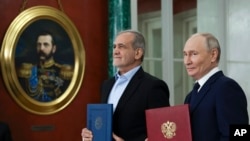Israel's strikes against Iran's nuclear complex and military leadership have sent shock waves around the globe, raising fears of escalation and a wider war in the region. But the shock-and-awe campaign also reverberated in Moscow, where Russian President Vladimir Putin has positioned himself as a powerful interlocutor with Tehran.
Russia's response to the strikes was swift and unequivocal. In a lengthy statement, the Foreign Ministry expressed its "utmost concern about the dangerous escalation of tensions in the Middle East" and accused Israel of violating international law.
"Unprovoked military strikes against a sovereign UN member state, its citizens, peaceful sleeping cities, and nuclear energy infrastructure are categorically unacceptable," the statement read.
"The international community cannot afford to remain indifferent to such atrocities that destroy peace and harm regional and international security."
The ministry said the timing of the attacks showed "particular cynicism," noting the Israeli strikes occurred during a meeting of the International Atomic Energy Agency's Board of Governors and just ahead of an anticipated sixth round of negotiations between representatives of Iran and the United States over Tehran's advancing nuclear ambitions.
That statement may strike some as cynical -- the phrase "sleeping cities" could easily refer to Russia's continued bombardment of Ukraine -- but the geopolitical impact of the strikes on Russia is clear. Israel's military campaign tests Iran's strategic partnership with Russia, and it potentially deprives the Kremlin of a valuable card when it comes to negotiating with Washington over Ukraine.
In a recent telephone conversation with US President Donald Trump, the Kremlin leader put himself forward as a possible broker of an agreement with Iran.
Posting on TruthSocial, Trump said, "I stated to President Putin that Iran cannot have a nuclear weapon and, on this, I believe that we were in agreement. President Putin suggested that he will participate in the discussions with Iran and that he could, perhaps, be helpful in getting this brought to a rapid conclusion."
Earlier this week, Moscow floated potential details about the role it could play in reining in Iran's nuclear program, suggesting Russia could help resolve tensions by exporting Iran's nuclear material for conversion into reactor fuel.
Israel's military moves against Iran, however, may potentially scupper diplomatic efforts to limit or reverse Tehran's nuclear program.
What's more, the strikes also targeted the leadership of Iran's military establishment, which has supplied Russia with inexpensive drone technology for waging war on Ukraine.
Russia has shifted production of the Shahed drones that routinely strike Ukrainian cities to its own facilities. But in a statement in response to Israel's strikes, Ukraine's Foreign Ministry called out Iran as part of a "group of aggressive regimes" that threaten international security. That group also includes North Korea.
"We would like to remind you that the Iranian regime supports Russia in its illegal war of aggression against Ukraine and provides Moscow with weapons to kill Ukrainians," the statement read. "Iran is the source of many problems in the Middle East and beyond."
Russia and Iran have deepened ties that were forged through their support of the now-ousted regime of Syrian President Bashar al-Assad. Iranian President Masud Pezeshkian signed a strategic partnership deal during a visit with Russian President Vladimir Putin in Moscow in January.
That partnership, however, has its limits.
Commenting on X, Hanna Notte of the James Martin Center for Nonproliferation Studies wrote, "Don't forget: the Strategic Partnership Treaty does not include mutual defense commitments of the type Moscow provided to DPRK [North Korea] & Belarus," noting that Russian Deputy Foreign Minister Andrey Rudenko recently clarified that Russia is not obliged to come to Iran's defense should it be attacked.
Russia is not the only country in the post-Soviet space condemning Israel's actions.
International Reaction To Israeli Strikes
In a post on X, the Armenian Foreign Ministry said, "the unilateral attack against Iran is deeply concerning. Taking place especially ahead of the next round of negotiations, it endangers the peaceful efforts as well as overall regional stability & global peace. We condemn such action & call for immediate cessation of hostilities & adherence to international law."
Azerbaijan, which like Armenia borders Iran, also condemned the escalation.
"We are seriously concerned about the military operations carried out by the State of Israel against the territory of the Islamic Republic of Iran," the country's Foreign Ministry said in a statement.
"We strongly condemn the escalation of the situation and urge the parties to resolve the existing disagreements only through dialogue and diplomatic means in accordance with the norms and principles of international law."
Turkey, meanwhile, issued a strong condemnation of Israel, calling the attacks "a blatant violation of international law" and "a provocation that serves Israel's strategic destabilization policy in the region."
Statements from European capitals were somewhat more circumspect.
In a social media post, British Prime Minister Keir Starmer called for "restraint, calm and a return to diplomacy" following the strikes.
"Escalation serves no one in the region," Starmer said. "Stability in the Middle East must be the priority and we are engaging partners to de-escalate."
European Commission President Ursula von der Leyen had a similar call for restraint while not pointing a finger of blame in any direction.
"Europe urges all parties to exercise maximum restraint, de-escalate immediately and refrain from retaliation," she wrote on X. "A diplomatic resolution is now more urgent than ever, for the sake of the region's stability and global security."
Whether this conflict comes to a swift resolution remains unclear.
In a post on TruthSocial, Trump seemed to suggest Iran still had the ability to come to the table.
"Iran must make a deal, before there is nothing left, and save what was once known as the Iranian Empire," he wrote . "No more death, no more destruction, JUST DO IT, BEFORE IT IS TOO LATE. God Bless You All!"
Whether Putin could play his promised role in such dealmaking, then, also remains an open question.












